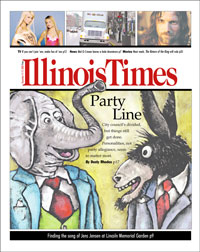In the escalating marketing wars, Walt Disney Studios employed one of the newest tricks, disguised as a kid-friendly treat, this past Halloween.
Reston-based online job-posting site CareerBuilder.com says 32 percent of the hiring managers surveyed in a recent poll plan to recruit new employees for expansion in the new year. The survey, based on e-mail responses from about 400 hiring managers, says hiring for expanding operations includes improving customer service and supporting the launch on new products or services. In addition, 52 percent will be hiring to replace employees who resigned or were laid off.
Internet advertising analysts are upbeat about prospects for 2004, but they're not indulging in the "irrational exuberance" that characterized the dotcom boom. Rather, they predict a slow and steady rate of growth. Smith Barney CFA Lanny Baker last month predicted a 20 to 25 percent increase in expenditures.
It appears that the newspaper industry got a Christmas present that it's been wanting for the past three years: An increase in help-wanted advertising. The Conference Board said Monday that its Help-Wanted Advertising Index rose in November as many areas of the country saw increases in employment classifieds and the nation's jobless rate trended down again. The Conference Board, which is probably best known for its consumer confidence surveys, also measures the volume of employment advertising in 51 newspapers nationwide every month.
For the advertising industry, the first of many changes expected next year will descend as soon as Thursday. That is when a law takes effect that regulates the unsolicited commercial e-mail almost universally derided as spam. The act may ease the problems associated with spam - which now accounts for half of all e-mail traffic - by banning false or deceptive headers on a message that can disguise the sender's identity and empowering the Federal Trade Commission to create a "do-not-spam" list, among other measures.
Serious record collectors generally do not flip through the CD's and DVD's at Wal-Mart, Best Buy or Target. The music departments in those stores are mainly known for offering a narrow selection of chart toppers. But increasingly mass merchandisers and electronics retailers have become the place to go for music that cannot be found anywhere else. That is because many big name artists with new releases to promote, do not just turn to their labels, they also strike exclusive deals with major retailers.
President Jay Smith and his chief financial officer, Charles "Buddy" Solomon, voted against censuring themselves for "violating business and journalism ethical standards" but were overruled by the other six members of Creative Loafing Inc.'s board of directors. The resolution's author, Sterling "Jim" Soderlind, accused the Cox executives of getting "a very good education in the alternative newspaper business while sitting on our board," and then using that knowledge to launch a competing free newspaper, Access Atlanta. John Sugg's Nov. 20 report on the meeting was followed by Smith's response the next week.
Six months after it began benchmarking the fledgling business of local search, The Kelsey Group says it has emerged as one of the hottest new online advertising categories. While the marketplace does face some unique challenges, the Kelsey analysts say the cost effectiveness of local search is so powerful that it ultimately could compete with other forms of advertising used by local businesses and services, including local yellow pages, direct mail, newspapers and radio.
- Go to the previous page
- 1
- …
- 776
- 777
- 778
- 779
- 780
- 781
- 782
- …
- 968
- Go to the next page

